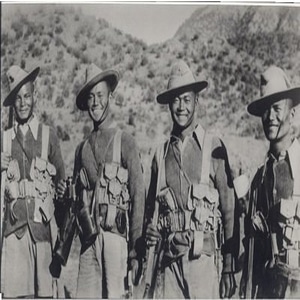
Gurkhas
CBUB Wins: 1
CBUB Losses: 1
CBUB Ties: 0
Win Percentage: 50.00%
Added by: ViceCityMobster86
Read more about Gurkhas at: Wikipedia
Official Site: Public Domain
The Gurkhas or Gorkhas ( ), with endonym Gorkhali ( , ), are soldiers native to South Asia of Nepalese nationality and Indian Gorkha ethnicity recruited for the British Army, Nepalese Army, Indian Army, Gurkha Contingent Singapore, Gurkha Reserve Unit Brunei, UN peacekeeping forces and in war zones around the world. Historically, the terms "Gurkha" and "Gorkhali" were synonymous with "Nepali", which originates from the hill principality Gorkha Kingdom, from which the Kingdom of Nepal expanded under Prithivi Narayan Shah. The name may be traced to the medieval Hindu warrior-saint Guru Gorakhnath who has a historic shrine in Gorkha District. The word itself derived from Go-Raksha ( i.e., 'Protector(रकà¥à¤·à¤¾) of cows(गो')), raksha becoming rakha (रखा). Rakhawala means 'protector' and is derived from raksha as well.
There are Gurkha military units in the Nepalese, British and Indian armies enlisted in Nepal, United Kingdom, and India. Although they meet many of the criteria of Article 47 of Protocol I of the Geneva Conventions regarding mercenaries, they are exempt under clauses 47(e) and (f), similar to Légion Étrangère
Gurkhas are closely associated with the khukuri, a forward-curving Nepali knife, and have a reputation for military prowess. Former Indian Army Chief of Staff Field Marshal Sam Manekshaw once stated that: "If a man says he is not afraid of dying, he is either lying or he is a Gurkha."
During the Anglo-Nepalese War (1814–1816) between the Gorkha Kingdom (present-day Federal Democratic Republic of Nepal) and the East India Company, the Gorkhali soldiers impressed the British, who called them Gurkhas.
CBUB Match Record:
| Result | Opponent | My Score | Their Score | |
|---|---|---|---|---|
| Loss | Minute Men (Kaiserreich) | 1 | to | 2 |
| Win | Minute Men (Kaiserreich) | 4 | to | 2 |
No Fantasy Draft Records Available
